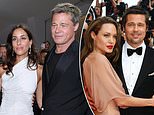President Jimmy Carter swore he saw a UFO and vowed to reveal the TRUTH… but he never did. So what happened, asks SHANE CASHMAN
- Shane Cashman is host of the Tales From the Inverted World podcast
- READ MORE: Jimmy Carter dead at 100
One Georgia night in 1969, Jimmy Carter looked up over the pine trees and saw a moving orb, as bright as the moon.
He was standing outside the local Lions' Club in Leary, where he was planning to address the meeting. But local politicking quickly vanished from his mind. The orb 'seemed to move toward us from a distance, stop, move partially away, return, then depart,' he said later, describing it as 'bluish at first, then reddish, luminous, not solid.' He called it 'the darndest thing I've ever seen.'
Carter's encounter with a UFO may pop up as a line in some of his obituaries, sandwiched between the sober analysis of his presidency and notable humanitarian work since. And like all politicians, he should be judged for his successes and failures, in office and out. But more than just an amusing footnote, this story gives us important insight into who he was as a man.
We have almost forgotten what it's like to have leaders capable of marveling at the unknown. For all the problems the country may have faced during his presidency, Jimmy Carter would openly consider the mysteries of life – before, during, and after his time in the White House – and he should be remembered for that.
Carter wasn't embarrassed to talk about his UFO sighting. In 1973, while serving as governor of Georgia, he filed a report documenting the sighting with the International UFO Bureau. He later said that after his own encounter, he would never again make fun of anybody who reported a similar experience.
His open-mindedness was rooted in the scientific training he received at college in Georgia, at the US Naval Academy, and later with his work on nuclear submarines. Carter maintained that just because something may be a UFO didn't mean it is extraterrestrial. Ultimately, he believed that what he saw - while unexplainable - was likely man-made.
Regardless, the encounter stayed with him for years. On the campaign trail in 1976, he made a point of promising that, as president, he'd release all UFO-related documents. By some accounts, after his election, he did in fact meet with then-CIA Director George H.W. Bush to make that request. Whatever may or may not have been said at that meeting, Carter never seemed to mention UFOs again - at least not publicly in his official capacity as a president.
He would later tell the American public that releasing such information would harm the interests of national security.

Jimmy Carter on his peanut farm in Plains, Georgia, in 1976

A file photo of a UFO in 1951
However, Carter's interest in UFOs didn't fully disappear. In 1977, with the help of Carl Sagan, NASA sent the Voyager spacecraft into deep space with a golden record that held recordings of greetings and music from various nations and cultures.
President Carter sent a message that read, in part: 'This is a present from a small distant world… We hope someday, having solved the problems we face, to join a community of galactic civilizations. This record represents our hope and our determination, and our good will in a vast and awesome universe.'
It's hard to imagine many of his successors using such language. No other president has even attempted to address UFO sightings head-on. Clinton reportedly said that if he'd seen any evidence, he would tell the people - but never did. George W. Bush joked to late night host Jimmy Kimmel that such a disclosure 'might spin you into orbit.' Obama seemed to give up on the cosmos altogether, basically halting NASA funding. President Trump created Space Force - but for the purposes of national security rather than space exploration. On UFOs, Trump said, 'I'm not a believer, but anything's possible.'
Carter's fascination with the unknown stayed with him long after he left the White House. In 1994, he published a poem called 'Considering the Void' - a meditation on the images the Voyager spacecraft sent back to Earth.
Nearly twenty years after he sent his letter into space, the 'void' still haunted him: 'When I behold the charm of evening skies, their lulling endurance… the skyscape of our Milky Way holding in its shimmering disc an infinity of suns (or say a thousand billion)... knowing that this galaxy of ours is one of multitudes in what we call the heavens, it troubles me. It troubles me.'
If he was troubled by the vastness of the cosmos, at least it's because he had the will to try to comprehend it – and that's something to be admired in a leader.
Shane Cashman is a writer for Timcast News and author of the new book Tales From the Inverted World: Ghosts of the Civil War.





















































































































































































































































































